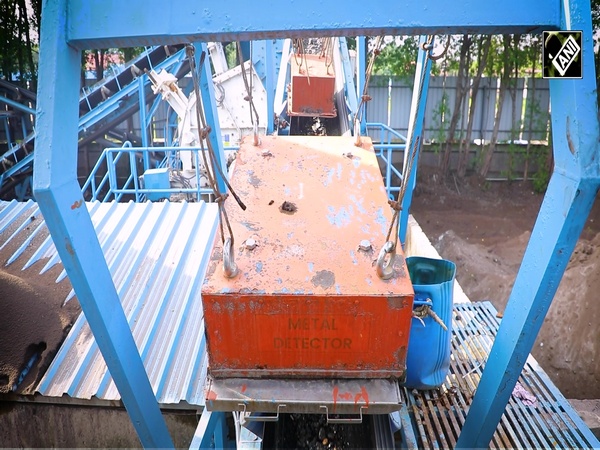Titan submersible crew dead after "catastrophic implosion": US Coast Guard
Jun 23, 2023

Washington DC (US), June 23 : Five passengers on the submersible named Titan, which was diving 13,000 feet to view the shipwreck of the British passenger liner Titanic which had sunk in the North Atlantic Ocean in the year 1912, have died in a "catastrophic implosion," US Coast Guard authorities confirmed on Thursday (local time), CNN reported.
After an extraordinary five-day international search operation near the site of the world's most famous shipwreck, the tail cone and other debris of the submersible were found by a remotely operated vehicle about 1,600 feet from the bow of the Titanic on the ocean floor about 900 east of Cape Cod in Massachusetts.
Passengers of the Titan, owned by OceanGate, the private US company that runs submersible tours to the Titanic, were confirmed to have died in the implosion the US Coast Guard authorities said.
The Washington Post cited experts to report that the company was operating in a legal gray area out at sea, where the American-made submersible was launched from a Canadian vessel into international waters.
A remotely operated vehicle found "five different major pieces of debris" from the Titan submersible, according to Paul Hankins, the US Navy's director of salvage operations and ocean engineering. The debris was "consistent with the catastrophic loss of the pressure chamber" and, in turn, a "catastrophic implosion," he said according to CNN.
The passengers included British businessmen and adventurer Hamish Harding, Shahzada Dawood and his son Suleman Dawood from a Pakistan prominent business family, French diver Paul-Henri Nargeolet and Stockton Rush, the CEO of OceanGate Expeditions, who acted as the pilot for the Titan.
They "shared a distinct spirit of adventure," the tour organising company, OceanGate Expeditions said in a statement, reported CNN.
The governments of Pakistan and the United Kingdom also offered condolences, CNN reported.
On Sunday (local time), the Titan descended into a 2-hour-long dive, but the submersible lost its connection with the surface about 1 hour 45 minutes in. The US Navy detected an acoustic signature consistent with an implosion on the same day and relayed that information to the commanders leading the search effort, a senior official told CNN.
The sound was determined to be "not definitive," the official said. John Mauger, the Rear Admiral of the US Coast Guard, and leader of the rescue mission, said that rescuers had sonar buoys in the water for at least the last 72 hours and had "not detected any catastrophic events." Listening devices set up during the search also did not record any sign of an implosion, he added, CNN reported.
According to reports by The Washington Post, the search mission required planes and ships from multiple countries that faced choppy seas and changing weather between Sunday and Thursday, as they desperately raced against time to find the Titan. The Coast Guard worked closely with Canadian authorities to scour the area by air, sea and sonar. But getting deep-sea equipment to the remote area presented a challenge.
Searchers were also contending with the possibility that the vessel could be at the surface, at the bottom of the sea or anywhere in between. And a rescue at the ocean floor would be thousands of feet deeper than any successfully attempted before.
The US Coast Guard had been working off an estimate that the passengers had about 96 hours of oxygen when the vessel lost contact, holding out the possibility that the submersible could be found intact before the oxygen supply ran out. Hopes were lifted after sonar picked up underwater noises on Tuesday and Wednesday.
But a Coast Guard official said on Thursday that those noises now appear to have been unrelated to the Titan. What's more, he said, had the implosion occurred after the sonar equipment had been deployed, the noise would have been detected -- meaning the catastrophe probably occurred earlier, The Washington Post reported.
Now that the debris has been found, the remotely operated vehicles will remain on the scene and continue to gather information, Rear Admiral of the US Coast Guard Mauger said. He said it will take time to determine a specific timeline of events in the "incredibly complex" case of the Titan's failure, and the agency will eventually have more information about what went wrong and its assessment of the emergency response, CNN reported.
Mauger applauded the "huge international" and "interagency" search effort. He said teams had the appropriate gear and worked as quickly as possible. The Coast Guard official also thanked experts and agencies for assisting with the search for the Titan submersible. (CNN)
Meanwhile, The White House thanked the US Coast Guard and international partners for their search and rescue efforts for the submersible that went missing on its way to the Titanic wreckage.
"This has been a testament to the skill and professionalism that the men and women who serve our nation continue to demonstrate every single day," a White House spokesperson said.
Earlier Thursday, the Coast Guard thanked experts and agencies from all over the world for assisting in the effort, calling it a "huge international" and "interagency" search.
The White House spokesperson also expressed sympathy for the families of the five passengers onboard the submersible.
"Our hearts go out to the families and loved ones of those who lost their lives on the Titan. They have been through a harrowing ordeal over the past few days, and we are keeping them in our thoughts and prayers," the spokesperson said, CNN reported.
According to The Washington Post, OceanGate first took regular citizens to the Titanic site in 2021 and had begun charging $250,000 a person for the expedition.
No certification was required for the trip because it occurred in international waters, outside any country's jurisdiction, and the operation did not require a permit or a specialized pilot's license, experts told The Washington Post.
In 2018, a former OceanGate employee expressed concerns about the Titan's safety and said the company should have the vessel inspected and certified, according to court filings in a lawsuit filed in federal court in Virginia. The suit was settled, and OceanGate declined to comment on it this week; in court documents, the company said the conclusions of its engineers differed from those of the former employee.
That same year, industry leaders in the Marine Technology Society became concerned that Rush was not following an industry-accepted testing and review process. One, Will Kohnen, drafted a letter, ultimately never sent, warning Rush that "a single negative event could undo" the stellar safety record of marine underwater vehicles.
OceanGate declined to comment on safety allegations this week.
James Cameron, who directed the 1997 blockbuster "Titanic" and has visited the wreckage on multiple research expeditions, echoed concerns about the Titan's safety.
"I'm struck by the similarity of the Titanic disaster itself, where the captain was repeatedly warned about ice ahead of his ship, and yet he steamed at full speed into an ice field on a moonless night," Cameron, who also made a documentary about the ship, told ABC News on Thursday.

















